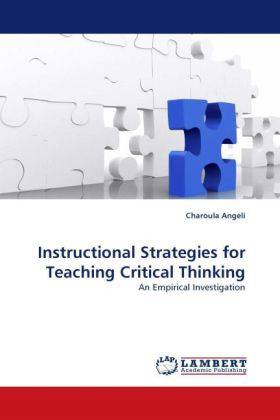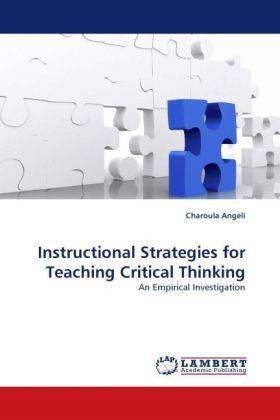
Door een staking bij bpost kan je online bestelling op dit moment iets langer onderweg zijn dan voorzien. Dringend iets nodig? Onze winkels ontvangen jou met open armen!
- Afhalen na 1 uur in een winkel met voorraad
- Gratis thuislevering in België vanaf € 30
- Ruim aanbod met 7 miljoen producten
Door een staking bij bpost kan je online bestelling op dit moment iets langer onderweg zijn dan voorzien. Dringend iets nodig? Onze winkels ontvangen jou met open armen!
- Afhalen na 1 uur in een winkel met voorraad
- Gratis thuislevering in België vanaf € 30
- Ruim aanbod met 7 miljoen producten
Zoeken
Instructional Strategies for Teaching Critical Thinking
An Empirical Investigation
Charoula Angeli
Paperback | Engels
€ 48,45
+ 96 punten
Omschrijving
Educators agree that critical thinking should not be just another educational option, but an indispensable part of education. Yet, the debate surrounding the construct and teaching of critical thinking raises two fundamental questions, namely: (1) What are the cognitive processes that underlie critical thinking? and (2) Should the teaching of critical thinking be general or contextualized? The focus of this book will be the examination of such fundamental questions. In particular, the author undertakes an empirical investigation to (a) examine the cognitive structure of critical thinking by investigating possible relationships among critical thinking, general thinking skills, dispositions, and epistemic beliefs, and (b) investigate the effects of the General, the Infusion, and the Immersion teaching approaches on learners' critical thinking performance. The findings would be valuable to those who are interested in promoting critical thinking in their classrooms, and academics and college students who are interested in the subject of critical thinking.
Specificaties
Betrokkenen
- Auteur(s):
- Uitgeverij:
Inhoud
- Aantal bladzijden:
- 120
- Taal:
- Engels
Eigenschappen
- Productcode (EAN):
- 9783838336138
- Verschijningsdatum:
- 11/01/2010
- Uitvoering:
- Paperback
- Formaat:
- Trade paperback (VS)
- Afmetingen:
- 152 mm x 229 mm
- Gewicht:
- 185 g

Alleen bij Standaard Boekhandel
+ 96 punten op je klantenkaart van Standaard Boekhandel
Beoordelingen
We publiceren alleen reviews die voldoen aan de voorwaarden voor reviews. Bekijk onze voorwaarden voor reviews.











